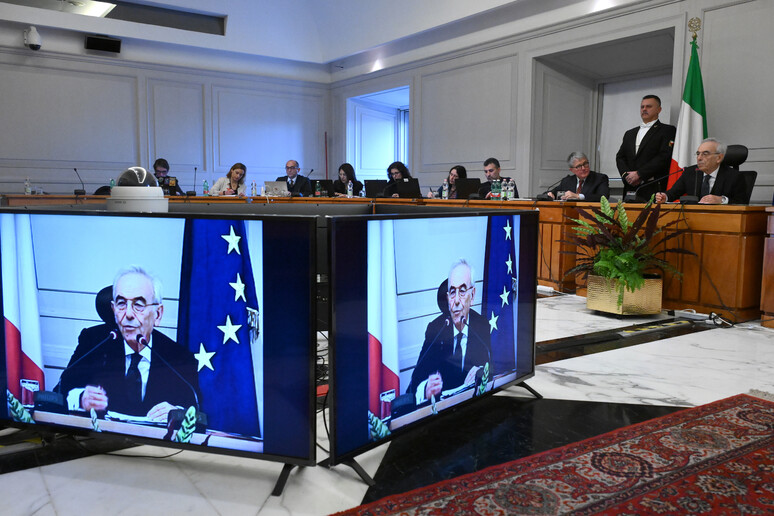Giovanni Amoroso, 76, is the new
president of the Constitutional Court.
His predecessor Augusto Barbera's term as president of the top
court expired on December 21 last year.
Amoroso, who was born in Mercato San Severino near Salerno on
March 30 1949, was elected on Tuesday by Italy's supreme
Cassation Court.
The newly elected president's mandate will end on November 13
2026.
Amoroso served as the court's interim president after the end of
Barbera's mandate.
He was elected Constitutional Court judge by the Court of
Cassation on October 26 2017 and was sworn in on November 13
that year.
He served as vice president of the court since December 12 2023.
After his election on Tuesday, Amoroso told a press conference
that his "commitment will be absolute" and that he will serve
"with discipline and honour, as required by article 54 of the
Constitution".
He told reporters that he had no program to outline as
president because the "Court is a deeply collegial body" and the
"Court's compass is the Constitution" and Europe its "polar
star".
Amoroso also told reporters that the "Court is not impaired even
with 11 judges", discussing a stalemate in Parliament over the
lack of an agreement on the appointment of four Constitutional
Court members.
"Parliament has in the past chosen excellent judges", he said,
adding that he expects top level judges to be chosen as the new
members of the court.
He recalled the value of previous court members including the
outgoing president Barbera and Silvana Sciarra.
The newly elected president also discussed legislation bringing
in 'differentiated autonomy' to enable regions to request more
power over how the tax revenues collected in their areas are
spent after the Constitutional Court on Monday declared
inadmissible a referendum for its complete abrogation.
Speaking about one of the issues that the Constitutional Court
ruled late last year were "illegitimate" and needed to be
corrected - which concerns the legitimacy of the minimum levels
of service (LEPs) that must be provided by all regions
nationwide being updated via a decree issued by the premier -
Amoroso highlighted the "need for the legislator to intervene
and determine the criteria for LEPs".
"There is no possibility of determining LEPs without the
intervention of the legislator", he said, adding that members of
parliament also needed to intervene on issues unrelated to LEps
concerning the "attribution of specific functions" for regions
as part of the legislation.
And Amoroso also commented on a controversial Constitutional
reform bill to separate the career paths of magistrates and
change the judiciary's self-governing body which has pitted the
executive parts of the judiciary saying "it is not beneficial
for the country if there is a situation that is not of conflict
but of non-harmony.
"The existence of various fronts does not benefit the country's
serenity.
"But here the Court has a specific role.
"This belongs to politics.
"The Constitutional Court controls the constitutionality of
laws", said its new president, discussing the opposition of
parts of the judiciary to the judicial reform.
Premier Giorgia Meloni, as is customary, called Amoroso to
congratulate him after his election.
The premier wished him well in his new role, well-informed
sources said.
ALL RIGHTS RESERVED © Copyright ANSA











